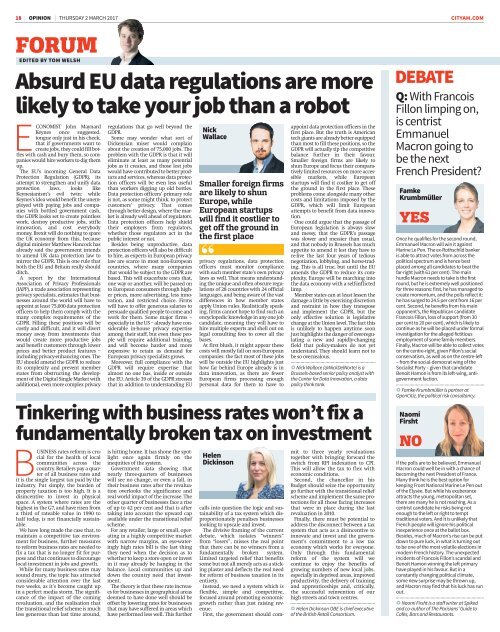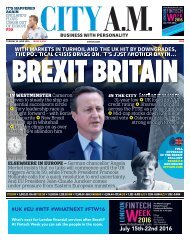IT’S BACK!
cityam-2017-03-02-58b76d1711574
cityam-2017-03-02-58b76d1711574
Create successful ePaper yourself
Turn your PDF publications into a flip-book with our unique Google optimized e-Paper software.
18 OPINION THURSDAY 2 MARCH 2017<br />
CITYAM.COM<br />
FORUM<br />
EDITED BY TOM WELSH<br />
Absurd EU data regulations are more<br />
likely to take your job than a robot<br />
ECONOMIST John Maynard<br />
Keynes once suggested,<br />
tongue only just in his cheek,<br />
that if governments want to<br />
create jobs, they could fill bottles<br />
with cash and bury them, so companies<br />
would hire workers to dig them<br />
up.<br />
The EU’s incoming General Data<br />
Protection Regulation (GDPR), its<br />
attempt to strengthen and unify data<br />
protection laws, looks like<br />
Keynesianism’s evil twin: while<br />
Keynes’s idea would benefit the unemployed<br />
with paying jobs and companies<br />
with bottled government cash,<br />
the GDPR looks set to create pointless<br />
work, destroy productive jobs, stifle<br />
innovation, and cost everybody<br />
money. Brexit will do nothing to spare<br />
the UK economy from this, because<br />
digital minister Matthew Hancock has<br />
already said the government intends<br />
to amend UK data protection law to<br />
mirror the GDPR. This is one rule that<br />
both the EU and Britain really should<br />
ditch.<br />
A report by the International<br />
Association of Privacy Professionals<br />
(IAPP), a trade association representing<br />
privacy specialists, estimates that businesses<br />
around the world will have to<br />
appoint at least 75,000 data protection<br />
officers to help them comply with the<br />
many complex requirements of the<br />
GDPR. Filling these positions will be<br />
costly and difficult, and it will divert<br />
money away from investments that<br />
would create more productive jobs<br />
and benefit customers through lower<br />
prices and better product features –<br />
including privacy-enhancing ones. The<br />
EU should amend the GDPR to reduce<br />
its complexity and prevent member<br />
states from obstructing the development<br />
of the Digital Single Market with<br />
additional, even more complex privacy<br />
BUSINESS rates reform is crucial<br />
for the health of local<br />
communities across the<br />
country. Retailers pay a quarter<br />
of all business rates and<br />
it is the single largest tax paid by the<br />
industry. Put simply, the burden of<br />
property taxation is too high. It is a<br />
disincentive to invest in physical<br />
space. A system where rates are the<br />
highest in the G7, and have risen from<br />
a third of rateable value in 1990 to<br />
half today, is not financially sustainable.<br />
We have long made the case that, to<br />
maintain a competitive tax environment<br />
for business, further measures<br />
to reform business rates are needed to<br />
fix a tax that is no longer fit for purpose<br />
and that continues to discourage<br />
local investment in jobs and growth.<br />
While for many business rates may<br />
sound dreary, the topic has attracted<br />
considerable attention over the last<br />
two weeks, as it’s become caught up<br />
in a perfect media storm. The significance<br />
of the impact of the coming<br />
revaluation, and the realisation that<br />
the transitional relief scheme is much<br />
less generous than last time around,<br />
regulations that go well beyond the<br />
GDPR.<br />
Some may wonder what sort of<br />
Dickensian miser would complain<br />
about the creation of 75,000 jobs. The<br />
problem with the GDPR is that it will<br />
eliminate at least as many potential<br />
jobs as it creates, and those lost jobs<br />
would have contributed to better products<br />
and services, whereas data protection<br />
officers will be even less useful<br />
than workers digging up old bottles.<br />
Data protection officers’ primary role<br />
is not, as some might think, to protect<br />
customers’ privacy. That comes<br />
through better design, where the market<br />
is already well ahead of regulators.<br />
Data protection officers help shield<br />
their employers from regulators,<br />
whether those regulators act in the<br />
public interest or not.<br />
Besides being unproductive, data<br />
protection officers will also be difficult<br />
to hire, as experts in European privacy<br />
law are scarce in most non-European<br />
countries, where many companies<br />
that would be subject to the GDPR are<br />
based. This will exacerbate costs that,<br />
one way or another, will be passed on<br />
to European consumers through higher<br />
prices, more advertising, less innovation,<br />
and restricted choice. Firms<br />
will have to offer generous salaries to<br />
persuade qualified people to come and<br />
work for them. Some major firms –<br />
especially in the US – already have considerable<br />
in-house privacy expertise<br />
among their staff, but even these people<br />
will require additional training,<br />
and will become harder and more<br />
expensive to retain as demand for<br />
European privacy specialists grows.<br />
Moreover, full compliance with the<br />
GDPR will require expertise that<br />
almost no one has, inside or outside<br />
the EU. Article 39 of the GDPR stresses<br />
that in addition to understanding EU<br />
is hitting home. It has shone the spotlight<br />
once again firmly on the<br />
inequities of the system.<br />
Government data showing that<br />
nearly three-quarters of businesses<br />
will see no change, or even a fall, in<br />
their business rates after the revaluation<br />
overlooks the significance and<br />
real world impact of the increase. The<br />
other quarter of businesses face a rise<br />
of up to 42 per cent and that is after<br />
taking into account the upward cap<br />
available under the transitional relief<br />
scheme.<br />
For any retailer, large or small, operating<br />
in a highly competitive market<br />
with narrow margins, an eye-wateringly<br />
high rates bill is the last thing<br />
they need when the decision as to<br />
whether to keep a store open or invest<br />
in it may already be hanging in the<br />
balance. Local communities up and<br />
down the country need that investment.<br />
The theory is that these rate increases<br />
for businesses in geographical areas<br />
deemed to have done well should be<br />
offset by lowering rates for businesses<br />
that may have suffered in areas which<br />
have performed less well. This further<br />
Nick<br />
Wallace<br />
Smaller foreign firms<br />
are likely to shun<br />
Europe, while<br />
European startups<br />
will find it costlier to<br />
get off the ground in<br />
the first place<br />
privacy regulations, data protection<br />
officers must monitor compliance<br />
with each member state’s own privacy<br />
laws as well. That means understanding<br />
the unique and often obscure regulations<br />
of 28 countries with 24 official<br />
languages, and being aware of the vast<br />
differences in how member states<br />
apply Union rules. Realistically speaking,<br />
firms cannot hope to find such an<br />
encyclopedic knowledge in any one job<br />
candidate, meaning they will have to<br />
hire multiple experts and shell out on<br />
legal consulting fees to cover all the<br />
bases.<br />
At first blush, it might appear these<br />
costs will mostly fall on non-European<br />
companies: the fact most of these jobs<br />
will be outside the EU highlights just<br />
how far behind Europe already is in<br />
data innovation, as there are fewer<br />
European firms processing enough<br />
personal data for them to have to<br />
appoint data protection officers in the<br />
first place. But the truth is American<br />
tech giants are already better equipped<br />
than most to fill these positions, so the<br />
GDPR will actually tip the competitive<br />
balance further in their favour.<br />
Smaller foreign firms are likely to<br />
shun Europe and focus their comparatively<br />
limited resources on more accessible<br />
markets, while European<br />
startups will find it costlier to get off<br />
the ground in the first place. These<br />
problems come alongside many other<br />
costs and limitations imposed by the<br />
GDPR, which will limit European<br />
attempts to benefit from data innovation.<br />
One could argue that the passage of<br />
European legislation is always slow<br />
and messy, that the GDPR’s passage<br />
was slower and messier than usual,<br />
and that nobody in Brussels has much<br />
appetite to amend it lest they have to<br />
re-live the last four years of tedious<br />
negotiation, lobbying, and horse-trading.<br />
This is all true, but until the EU<br />
amends the GDPR to reduce its complexity,<br />
Europe will be marching into<br />
the data economy with a self-inflicted<br />
limp.<br />
Member states can at least lessen the<br />
damage a little by exercising discretion<br />
and restraint in how they transpose<br />
and implement the GDPR, but the<br />
only effective solution is legislative<br />
change at the Union level. The fact this<br />
is unlikely to happen anytime soon<br />
just highlights the danger of over-regulating<br />
a new and rapidly-changing<br />
field that policy-makers do not yet<br />
understand. They should learn not to<br />
be so overzealous.<br />
£ Nick Wallace (@NickDelNorte) is a<br />
Brussels-based senior policy analyst with<br />
the Center for Data Innovation, a data<br />
policy think tank.<br />
Tinkering with business rates won’t fix a<br />
fundamentally broken tax on investment<br />
Helen<br />
Dickinson<br />
calls into question the logic and sustainability<br />
of a tax system which disproportionately<br />
penalises businesses<br />
looking to upscale and invest.<br />
The divisive framing of the current<br />
debate, which isolates “winners”<br />
from “losers”, misses the real point<br />
that there can be no winners from a<br />
fundamentally broken system.<br />
Limited targeted relief that benefits<br />
some but not all merely acts as a sticking<br />
plaster and deflects the real need<br />
for reform of business taxation in its<br />
entirety.<br />
Instead, we need a system which is<br />
flexible, simple and competitive,<br />
focused around promoting economic<br />
growth rather than just raising revenue.<br />
First, the government should commit<br />
to three yearly revaluations<br />
together with bringing forward the<br />
switch from RPI indexation to CPI.<br />
This will allow the tax to flex with<br />
economic conditions.<br />
Second, the chancellor in his<br />
Budget should seize the opportunity<br />
go further with the transitional relief<br />
scheme and implement the same protections<br />
for all those facing increases<br />
that were in place during the last<br />
revaluation in 2010.<br />
Finally, there must be potential to<br />
address the disconnect between a tax<br />
system that acts as a disincentive to<br />
innovate and invest and the government’s<br />
commitment to a low tax<br />
economy which works for everyone.<br />
Only through this fundamental<br />
reform of the system will we<br />
continue to enjoy the benefits of<br />
growing numbers of new local jobs,<br />
especially in deprived areas, improved<br />
productivity, the delivery of training<br />
and apprenticeships and, critically,<br />
the successful reinvention of our<br />
high streets and town centres.<br />
£ Helen Dickinson OBE is chief executive<br />
of the British Retail Consortium.<br />
DEBATE<br />
Q: With Francois<br />
Fillon limping on,<br />
is centrist<br />
Emmanuel<br />
Macron going to<br />
be the next<br />
French President?<br />
Famke<br />
Krumbmüller<br />
YES<br />
Once he qualifies for the second round,<br />
Emmanuel Macron will win it against<br />
Marine Le Pen. The ex-Rothschild banker<br />
is able to attract votes from across the<br />
political spectrum and is hence best<br />
placed among all candidates to beat the<br />
far-right (with 61 per cent). The main<br />
hurdle Macron needs to take is the first<br />
round, but he is extremely well positioned<br />
for three reasons: first, he has managed to<br />
create momentum, and the polls reflect it:<br />
he has surged to 24.5 per cent from 16 per<br />
cent. Second, he benefits from his main<br />
opponent’s, the Republican candidate<br />
Francois Fillon, loss of support (from 30<br />
per cent to 20 per cent), which is likely to<br />
continue as he will be placed under formal<br />
investigation for the alleged fictitious<br />
employment of some family members.<br />
Finally, Macron will be able to collect votes<br />
on the centre-right, given Fillon’s social<br />
conservatism, as well as on the centre-left<br />
– from the social-democrat wing of the<br />
Socialist Party – given that candidate<br />
Benoit Hamon is from its left-wing, antigovernment<br />
faction.<br />
£ Famke Krumbmüller is partner at<br />
OpenCitiz, the political risk consultancy.<br />
Naomi<br />
Firsht<br />
NO<br />
If the polls are to be believed, Emmanuel<br />
Macron could well be in with a chance of<br />
becoming the next President of France.<br />
Many think he is the best option for<br />
keeping Front National Marine Le Pen out<br />
of the Elysée. But while his exuberance<br />
attracts the young, metropolitan set,<br />
there are many he is not reaching. As a<br />
centrist candidate he risks being not<br />
enough to the left or right to tempt<br />
traditional voters. And it is unlikely that<br />
French people will ignore his political<br />
inexperience once at the ballot box.<br />
Besides, much of Macron’s rise can be put<br />
down to pure luck, in what is turning out<br />
to be one of the most volatile elections in<br />
modern French history. The unexpected<br />
incidents of Francois Fillon’s scandal and<br />
Benoit Hamon winning the left primary<br />
have played in his favour. But in a<br />
constantly changing political climate,<br />
some new surprise may be thrown up,<br />
and Macron may find that his luck has run<br />
out.<br />
£ Naomi Firsht is a staff writer at Spiked<br />
and co-author of The Parisians’ Guide to<br />
Cafés, Bars and Restaurants.
















